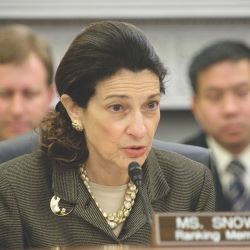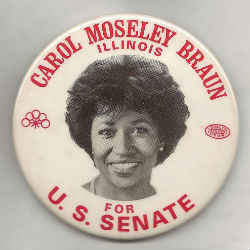 | 202403 15Women of the Senate Oral History Project
March 15, 2024
In honor of Women’s History Month, the Senate Historical Office introduces two oral history interviews in the Women of the Senate collection, Senators Barbara Boxer of California and Olympia Snowe of Maine. The Women of the Senate Oral History Collection documents women’s impact on the institution and its legislative business.
In honor of Women’s History Month, the Senate Historical Office introduces two new oral history interviews in the Women of the Senate collection, Senators Barbara Boxer of California and Olympia Snowe of Maine. The Women of the Senate Oral History Collection documents women’s impact on the institution and its legislative business.
Since 1976 the Senate Historical Office has conducted interviews with senators and staff. The mission of this project is to document and preserve the individual histories of a diverse group of personalities who witnessed events firsthand and offer a personal perspective on Senate history.
Just 60 women have served in the Senate since the first woman took the oath of office in 1922. By recording and preserving the stories of the Women of the Senate, we hope to develop a fuller, richer understanding of women’s role in the Senate and in governing the nation. From the role models who inspired them, to their decision to run for office, to their bonds with other senators, the stories of women in the Senate are central to understanding Senate history.
Barbara Boxer served in the United States Senate from 1993 to 2017 as a Democrat representing the State of California. Her opposition to the Vietnam War drew her to politics, and in 1976 she won her first election to public office, serving on the Marin County Board of Supervisors. She later served five terms in the U.S. House of Representatives (1983–1993), and in 1992 she won a seat in the U.S. Senate, joining Dianne Feinstein as the first women elected to the Senate from the State of California. In the Senate, Boxer championed international peace, equal rights and equal pay for women, and advocated for wildlife protections and environmental conservation. From 2007 to 2015, Boxer chaired two Senate committees, the Senate Committee on Environment and Public Works, and the Select Committee on Ethics—the first woman to lead each of those committees. She authored clean water legislation, pushed for legislation to address climate change, and shepherded bipartisan infrastructure bills through the Senate. In this interview, she discusses how the Senate’s design encourages bipartisanship, the value of having diverse viewpoints in the Senate, and the importance of having a thick skin while serving in public office.
Maine Republican Olympia Snowe won a seat in the U.S. Senate in 1994 after serving eight terms in the House of Representatives. During her three Senate terms (1995–2013), she became the first woman to chair the Committee on Small Business and Entrepreneurship and also served on the Committees on Armed Services, Commerce, Science and Transportation, and Foreign Relations. She worked to build bipartisan support for a number of legislative initiatives, including expanding health care access, balancing budgets, and addressing sexual harassment in the military.
In this interview, Snowe describes her early role models and meeting Maine’s first woman senator, trailblazer Margaret Chase Smith (1949–1973). Snowe considered herself a pragmatic lawmaker with a passion and penchant for public service. She discusses the differences between serving in the House and Senate, the role of women in lawmaking, the importance of the Senate’s bipartisan women’s monthly dinners, and the significance of placing the Portrait Monument (a statue dedicated to women’s suffrage leaders) in the Capitol Rotunda. At times during her Senate career, Snowe took political positions that were at odds with her own party conference, and she explains how and why she defended those positions.
These interviews are just a sample of the voices collected by the Senate Historical Office as part of its Women of the Senate oral history project. In addition to the complete interview transcripts, the Historical Office presents select video and audio excerpts that help to define and articulate the transformative role of women in Senate history. This curated video highlights how these senators and staff understood their role in the Senate and presents their reflections on how the growing number of women in the Senate have at times subtly and at times directly shaped legislative agendas.
|
 | 202007 29The Senate Oral History Project
July 29, 2020
Learn about the U.S. Senate through the stories of those who helped to shape it. Since the 1970s, Senate historians have conducted oral history interviews with senators, officers, and staff. These interviews preserve the individual experiences of a diverse group of personalities who witnessed events firsthand and offer unique perspectives on national events, politics, and policy, as well as the evolution of the Senate. Each interview provides a unique perspective on Senate history, offering a deeper and more nuanced understanding of congressional action and life on Capitol Hill.
Learn about the U.S. Senate through the stories of those who helped to shape it. Since the 1970s, Senate historians have conducted oral history interviews with senators, officers, and staff. These interviews preserve the individual experiences of a diverse group of personalities who witnessed events firsthand and offer unique perspectives on national events, politics, and policy, as well as the evolution of the Senate. The interviews below represent a small sample of the larger collection.
On January 3, 1993, Carol Moseley Braun became the first woman from Illinois and the first African American woman to serve in the U.S. Senate. As one of only seven women senators and the only African American in the Senate at the time, Moseley Braun experienced a level of constituent demands rarely seen before. “I had a job to do. I had to represent the people of Illinois. That means attending to their business. That means being a legislator. That means constituent service work … That's how I saw what I was supposed to do.”
Elizabeth Letchworth began her Senate career as a page in the 1970s and moved on to serve in the Republican cloakroom and as a floor assistant. In these positions, she often worked at the heart of the action in the Senate Chamber. In 1995 senators elected her Republican Party secretary, the first woman to serve in that position. “Because of the nature of the job, because it’s not a job where you can learn from reading books or going to classes, it is the epitome of on-the-job training.”
Carl Marcy served for 18 years as chief of staff for the Senate Foreign Relations Committee during the height of the Cold War. Marcy recalls that pivotal era as one in which the trust between Congress and the White House steadily eroded, most notably over the war in Vietnam. “It was during that summer [of 1965] that I think the administration began to worry a little bit about what [Foreign Relations Chairman Bill] Fulbright's attitude was. He was a bit too independent for them.”
These and other stories are found in the many interviews that make up the Senate Oral History Project. The Historical Office recently redesigned the online presentation of its oral histories. A wide-ranging selection of interviews can now be searched by name, position, or era, and by a select number of subjects and events. Each interview provides a unique perspective on Senate history, offering a deeper and more nuanced understanding of congressional action and life on Capitol Hill.
|

